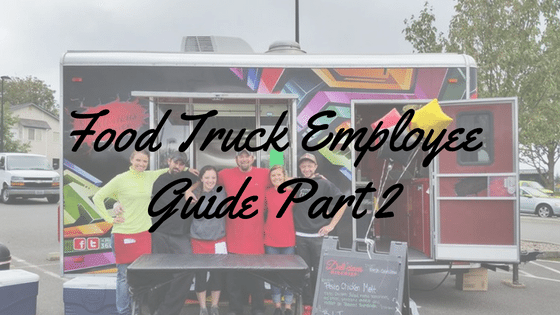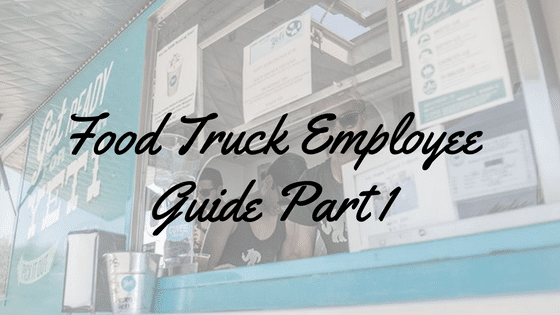
Food Truck Employee Guide Part 2
Welcome to part 2 of the Food Truck Employee Guide! In this post we’ll cover payroll, healthcare, managing and the unfortunate reality of terminating an employee.
Shout out to Terrence of TBD Foods for helping us with this post. TBD foods offers fine dining chef service – specializing in farm to table fare.
Let’s dive back in, and check out Food Truck Employee Guide Part 1 if you missed it!
Pay and Benefits
After finding the right candidates, you need to hire these folks and make sure they are happy with the offer you’re presenting to them.
First you need to figure out what to pay these new food truck employees, should it be hourly or salary? Full or part-time?
Before you overload yourself with all these questions take a breath. Look to other
Payroll Accounting
Having an employee requires you to file state and federal taxes (Unemployment tax, Social Security, and Medicare tax) as well as document pay.
This can be a daunting task and take your focus away from growing your business. You might be tempted to outsource all your accounting. However, I caution against that. Where your income and expenses are coming from is the pulse of your business. Monitoring that pulse and understanding the financial details will allow you to make sound business decisions.
To keep in touch with your financials while outsourcing the detail work, I recommend a free program called Wave accounting or QuickBooks Online.

By taking small steps and keeping up with your expense and income weekly, bi-weekly or monthly, you’ll set yourself up for success come tax time. If you keep your books current, it can easily be exported to your accountant.
TIP: Meet with your accountant at the start of each year to make sure you categorize expenses and income correctly.
Health Care and Workers Comp
Healthcare continues to be a trending topic nationally. It also plays a large role in the food truck business.
Fortunately, a food truck employee tends to be young. Workers under 26 are still covered by their parents insurance, so hopefully they wouldn’t need your coverage!
For yourself and employees who do need coverage, healthcare.gov or your state’s healthcare exchange site can provide options. There are subsidies that can be obtained based on income.

For an overview of each state’s requirements, check out Workers’ Compensation Laws – State by State Comparison
What is workers comp?
Workers comp covers employee’s medical, disability, rehabilitation, or death as a result from an accident in the course of employment.
Why carry it?
Workers comp insurance protects employers from most employee injury lawsuits and promotes workplace safety.
Managing Employees
Hopefully by this point you’ve done your due diligence and your team is growing! Naturally, this growth requires management. This is where you come in.
To ensure the paychecks are accurate each week, make sure you have a time clock or clock in clock out system. Compare that to the week schedule and compile the info weekly or bi-weekly.
Depending on where your food truck is, your business will fluctuate with the weather. Obviously in colder areas, business is slower in the winter months. It also slows as the heat rises in the summertime! Weather becomes a reason for hungry patrons to venture to areas of air conditioning compared to your truck’s al fresco dining.

With these fluctuations the size of your staff will also vary, which can be tough on employees having their hours and paychecks dwindle. Let your staff know of these changes well in advance to be prepared for the slow down.
This communication will allow your employees to look for other work if they want. As their employer, respect their decision to find another part-time job or another job entirely.
Remember,your employees do have bills to pay and it would be unfair to expect them to wait around until the busy season not working to help your business.
It is a tough situation when the weather does change. This advanced notice of hours being cut will help your food truck employees plan to make alternate plans when hours are cut.

Time to terminate an employee?
Firing an employee is challenging in itself. Combine that with the fact that possible missteps can result in a lawsuit! You’ll need to tread lightly when looking to part ways with employees.
Use the below PDF as a guide when seeking a preliminary legal opinion from your own counsel before terminating an employee. This should aid your counsel in evaluating whether the proposed termination creates potential legal exposure and the need for additional legal advice.
Be sure to check out the first part of this blog series – Food Truck Employee Guide Part 1
This article was a collaboration of Joel Paprocki of InsureMyFood.com and Terrence Rogers of TBD Foods.


 This does require some time to create, check out
This does require some time to create, check out 

 Joel Paprocki, CIC, CRM, CPCU is founder of Insure My Food. Joel has over 20 years of experience in the insurance industry. He is passionate about helping food entrepreneurs navigate insurance and risk management with confidence. He holds all three top industry designations: Certified Insurance Counselor, Certified Risk Manager, and Chartered Property and Casualty Underwriter. He has served over 5,000 clients in the food industry, including restaurants, food truck, cateriers, If you are looking for a reliable, experienced, and specialized insurance partner, please contact us.
Joel Paprocki, CIC, CRM, CPCU is founder of Insure My Food. Joel has over 20 years of experience in the insurance industry. He is passionate about helping food entrepreneurs navigate insurance and risk management with confidence. He holds all three top industry designations: Certified Insurance Counselor, Certified Risk Manager, and Chartered Property and Casualty Underwriter. He has served over 5,000 clients in the food industry, including restaurants, food truck, cateriers, If you are looking for a reliable, experienced, and specialized insurance partner, please contact us.